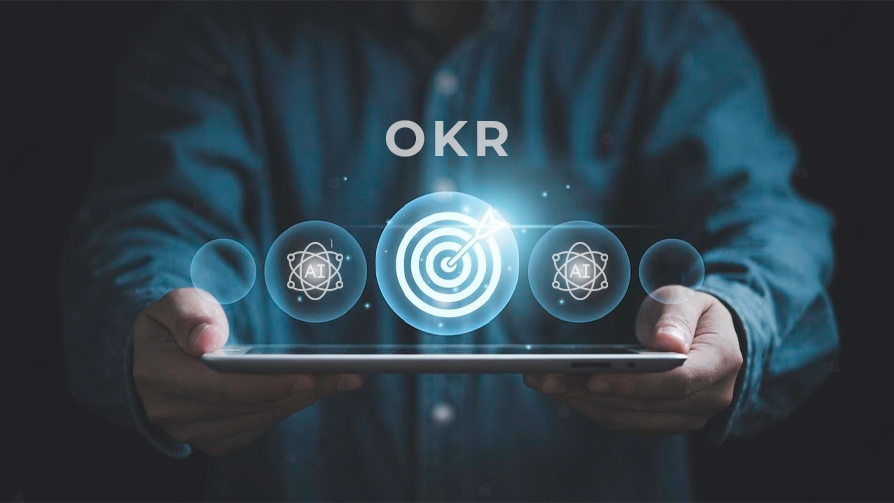In the realm of goal setting and performance tracking, the concept of Objectives and Key Results (OKRs) has gained widespread recognition as a powerful methodology. OKRs have helped countless organizations align their teams, drive focus, and achieve remarkable results. However, as we look ahead to the future, an exciting development promises to further revolutionize the world of OKRs – the integration of artificial intelligence (AI).
In this blog, we will explore the transformative potential of AI in goal setting and tracking, and how it is poised to reshape the landscape of OKRs. From enhanced data analytics and predictive insights to intelligent recommendations and automated progress tracking, AI holds the key to unlocking new levels of efficiency and effectiveness in pursuing and accomplishing our objectives.
Join us as we embark on a journey into the future of OKRs, where AI takes center stage and transforms the way we set, track, and achieve our goals. Get ready to witness the fusion of human ingenuity and technological innovation as we delve into the boundless possibilities that lie ahead.
The Rise of AI
AI has emerged as a groundbreaking technology that is reshaping industries across the globe. With its ability to process vast amounts of data, recognize patterns, and make intelligent decisions, AI is revolutionizing the way organizations operate. In the context of OKRs, AI holds immense potential to transform goal setting and tracking, ushering in a new era of efficiency, accuracy, and innovation.
AI-Powered Data Analytics
One of the key areas where AI can revolutionize goal setting and tracking is data analytics. AI algorithms can analyze large volumes of data quickly and extract valuable insights that might have been overlooked by human analysis alone. By leveraging AI-powered data analytics, organizations can better understand their performance, identify trends, and make data-driven decisions to refine their OKRs.
Predictive Insights
With AI’s ability to analyze historical data, organizations can go beyond mere observation and gain predictive insights. AI algorithms can identify patterns and trends, enabling organizations to anticipate future outcomes and make proactive adjustments to their OKRs. By leveraging predictive insights, organizations can stay ahead of the curve and align their goals more effectively to achieve desired outcomes.
Intelligent Recommendations
AI can provide intelligent recommendations to optimize goal setting and tracking. By analyzing data related to past performance, individual capabilities, and external factors, AI algorithms can suggest specific actions, initiatives, or milestones that can lead to improved goal achievement. These intelligent recommendations can help organizations fine-tune their OKRs and align them with the most impactful strategies.
Automation of Progress Tracking
Tracking progress against OKRs is a crucial aspect of goal achievement. AI can automate this process by integrating with project management and productivity tools. By automatically capturing and analyzing data related to key results, AI can provide real-time updates on progress, identify bottlenecks or areas needing attention, and generate insightful reports. This automation saves time and effort, enabling teams to focus on driving results rather than manual tracking.
Real-time Performance Monitoring
AI facilitates real-time performance monitoring by continuously collecting and analyzing data from various sources. This enables organizations to have instant visibility into their teams’ progress and performance against OKRs. Real-time performance monitoring allows for timely interventions, feedback, and adjustments, empowering teams to stay on track and make necessary course corrections promptly.
Adaptive Goal Setting
The dynamic nature of today’s business landscape often requires organizations to adapt their goals in response to changing circumstances. AI can assist in adaptive goal setting by analyzing real-time data and market trends. By leveraging AI’s insights, organizations can adjust their objectives and key results to align with evolving business conditions, ensuring their OKRs remain relevant and responsive to external factors.
Collaboration and Communication
Effective collaboration and communication are vital for successful goal achievement. AI-powered tools can enhance collaboration among team members by providing centralized platforms for sharing OKRs, progress updates, and feedback. Additionally, AI can facilitate seamless communication by automating reminders, and notifications, and facilitating real-time discussions, ensuring teams stay aligned and informed.
Ethical Considerations
As organizations embrace AI for goal setting and tracking, it is crucial to address ethical considerations. Privacy concerns, data security, and bias in AI algorithms need to be carefully managed. Transparent and ethical practices should be followed in data collection, usage, and decision-making processes to ensure fairness, inclusivity, and respect for privacy rights.
Challenges and Limitations
While AI offers tremendous potential, there are challenges and limitations to be aware of. Implementing AI-powered systems and infrastructure can be complex and require significant investments. Data quality and availability may also pose challenges, as AI heavily relies on accurate and diverse datasets. Additionally, organizations must navigate the cultural shift and ensure that employees embrace AI as an enabler rather than a threat to their roles.
The Future Landscape
Advancements in technology and AI capabilities will revolutionize goal setting and tracking. Personalization will be key, as AI algorithms tailor objectives and key results to individuals’ unique strengths and career paths. Augmented decision-making will be facilitated by advanced analytics and predictive modeling.
Integration with smart devices and wearables will provide real-time data, while natural language processing and voice assistants will simplify interactions. Continuous feedback and performance monitoring will be enabled through AI algorithms, driving ongoing improvement. Gamification and behavioral science principles will enhance engagement and motivation.
Machine learning will optimize goal-setting methodologies, and cross-organizational alignment will be facilitated. Ethical considerations will remain crucial, and integration with virtual and augmented reality will provide immersive experiences. The future landscape of AI in OKRs promises unprecedented
Conclusion
The future of OKRs intertwined with AI is poised to revolutionize goal setting and tracking. With AI-powered data analytics, predictive insights, and intelligent recommendations, organizations can expect personalized, efficient, and dynamic goal achievement. Embracing this transformative synergy will unlock new levels of success and propel organizations toward a future of unparalleled achievements.



 for growth seeking organizations.
for growth seeking organizations.
Comments are closed